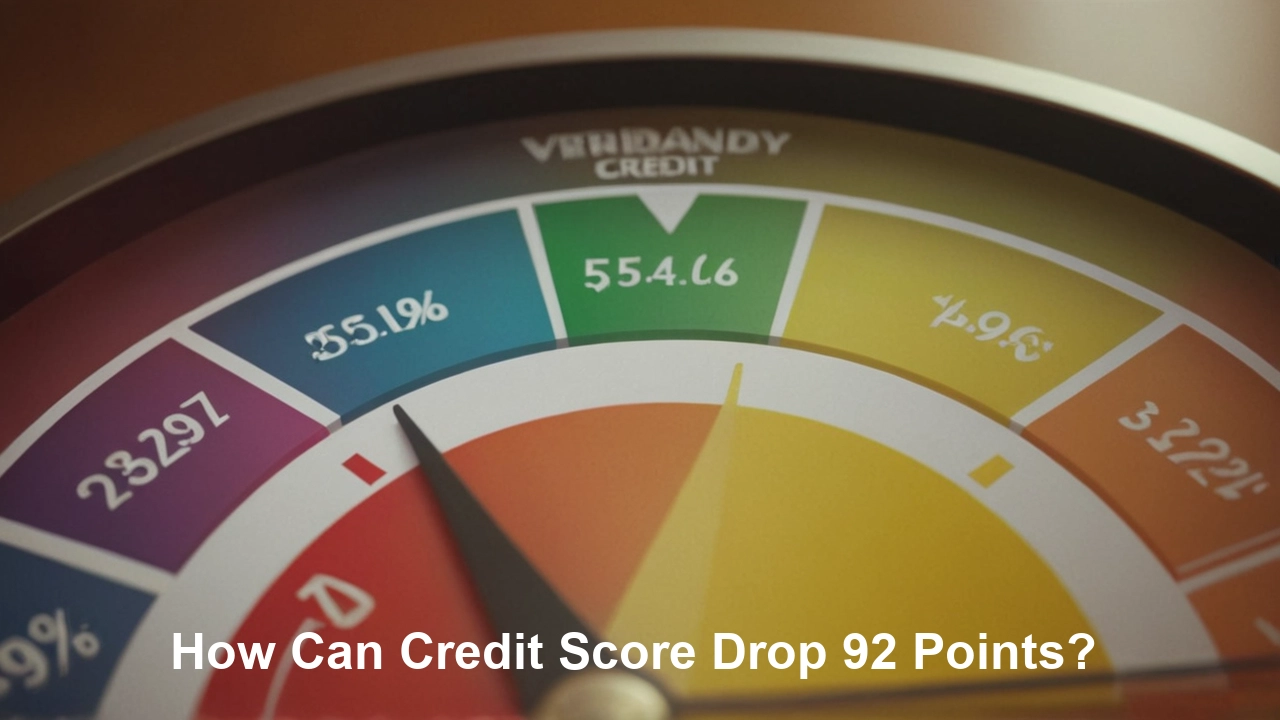-
Posted on: 28 Nov 2024

-
A reduction of 92 points on the credit score could be as shocking as being knocked in the belly if one had been very keen on observing all credit Score features. The loss is very important and points to some changes in your reports and you may want to know why and how you can fix the situation. In this blog, we will as well look at the various causes that make your credit score to drop by 92 points and the measures that you can take to tackle this issue.
Credit Score Question: What Causes a 92-Point Drop in Credit Score?
However, this can be attributed to several reasons that may commonly lead to a sharp decline in your credit score. Some of these include:
1. Late Payments
This is one of the main reasons why, after paying your credit card bill, your credit score will drop drastically: failure to make timely payments. Payment history is one of the key components of your credit score and accounts for 35% of your overall credit score and can drop your score by 90 to 110 points if you miss one payment. If you are at least 30 days past due in your payment, then they will report this fact to the credit bureaus and it appears on your credit report.
2. High Credit Utilization
The credit utilization ratio refers to the degree to which an individual has taken a credit and its amount about the total credit limit. In an ideal world, you should strive to keep your utilization below 30%. But if you spend more than half of the credit limit on your credit card, then you will experience a drop of up to 10 scores. This is in that high credit utilization means that you rely greatly on credit, and hence, may not be able to meet any new credit obligations.
3. New Hard Inquiries
Any time you apply for new credit most probably a hard inquiry will be made on your credit report. Multiple hard inquiries give your score a blow and can bring it down by as much as 10 points even though a couple of inquiries will not set you back a lot. This is because several hard inquiries indicate that you may be overborrowing which is not good for most lenders.
4. Closed Credit Accounts
If they close your credit accounts, then it will be a bad thing too, because once again, you have a lower credit limit. When you decide to close a credit card that has a large credit limit it can hurt your score in that your credit utilization is affected. However, if you have an old account that you want to close it will reduce the account age because it contributes 15% of your credit score.
5. Declined Credit Applications
Another reason you lose significantly on the credit score is if recently you have been declined for credit. When a lender looks at your credit report and chooses to reject your application, they are required to write a note on the same credit file explaining why the application was declined. This can lower your score by up to 25 points because the credit card company indicates you are probably an irresponsible borrower.
This article focuses on actions that you can take to build better your credit score.
When you know the causes of the drop in your credit score, you can work on how to get a better one. Here are some measures you can implement to get your score back on track:
1. Pay All Bills on Time
Always be up to date on your bill payment as this is highly detrimental to your credit score. To avoid missing any payment stay updated and make regular payments or make sure there are reminders to alert you. If you have made some late payments in the past you should contact your creditors to make them delete the late payment from your credit report before they forward it to credit-reference agencies.
2. Reduce Credit Utilization
To enhance your credit utilization, you need to reduce your credit card balances that you have accrued or you need to get your credit limits raised. It is best if you maintain your credit utilization ratio at under 30% on all of your credit cards. Do not apply for credit because this will reduce your credit score due to the high utilization ratio and cause the creation of more hard inquiries.
3. Review Your Credit Report
These can include mistakes like incorrect payment statuses or wrongly opened accounts while others should have been closed. You can order your free credit report through the Annual Credit Report website from the three credit bureaus namely Equifax, Experian, and TransUnion once a year. If you do, challenge the errors with credit bureaus to have them reversed.
4. Avoid New Hard Inquiries
Credit inquiries should also be done carefully because frequent requests for a new credit facility within a short space of time may harm your credit score. Do not apply for new credit as and when you need but when you are very sure of getting approved and should also space the application in between.
5. Keep Old Credit Accounts Open
If you have any of those accounts, that you are not currently using, do not close them instead leave them inactive. This goes a long way in keeping an average age of your accounts which in turn helps in enhancing your credit score. However, if an account has an annual fee it is recommended that you close it, but once again have an eye on the impact this will make on the credit utilization ratio as well as the average age of accounts.
Conclusion:
An undue amount of anxiety for a 92-point cut in your credit score, and knowing what transpired can help you once again regulate your financial status. Pay all your bills on time, use only a limited amount of your credit, check your credit report for mistakes, avoid getting credit reports made for other purposes, and do not close old accounts. You can increase your credit score, and avert similar future declines by executing these strategies:
Don’t wait! Call (888) 803-7889 and take charge of your financial future today!











